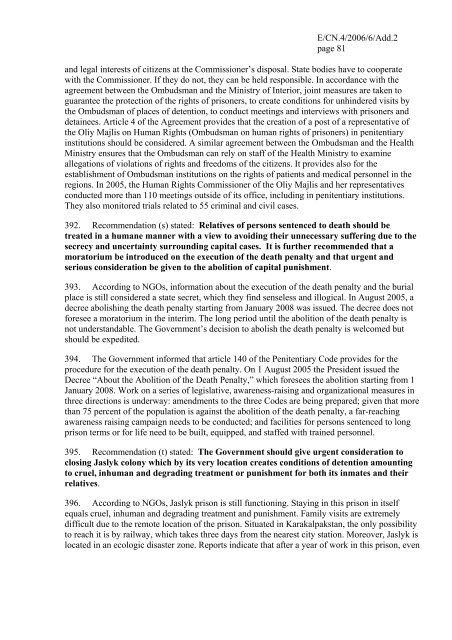E Economic and Social Council - acnudh
E Economic and Social Council - acnudh
E Economic and Social Council - acnudh
Create successful ePaper yourself
Turn your PDF publications into a flip-book with our unique Google optimized e-Paper software.
E/CN.4/2006/6/Add.2<br />
page 81<br />
<strong>and</strong> legal interests of citizens at the Commissioner’s disposal. State bodies have to cooperate<br />
with the Commissioner. If they do not, they can be held responsible. In accordance with the<br />
agreement between the Ombudsman <strong>and</strong> the Ministry of Interior, joint measures are taken to<br />
guarantee the protection of the rights of prisoners, to create conditions for unhindered visits by<br />
the Ombudsman of places of detention, to conduct meetings <strong>and</strong> interviews with prisoners <strong>and</strong><br />
detainees. Article 4 of the Agreement provides that the creation of a post of a representative of<br />
the Oliy Majlis on Human Rights (Ombudsman on human rights of prisoners) in penitentiary<br />
institutions should be considered. A similar agreement between the Ombudsman <strong>and</strong> the Health<br />
Ministry ensures that the Ombudsman can rely on staff of the Health Ministry to examine<br />
allegations of violations of rights <strong>and</strong> freedoms of the citizens. It provides also for the<br />
establishment of Ombudsman institutions on the rights of patients <strong>and</strong> medical personnel in the<br />
regions. In 2005, the Human Rights Commissioner of the Oliy Majlis <strong>and</strong> her representatives<br />
conducted more than 110 meetings outside of its office, including in penitentiary institutions.<br />
They also monitored trials related to 55 criminal <strong>and</strong> civil cases.<br />
392. Recommendation (s) stated: Relatives of persons sentenced to death should be<br />
treated in a humane manner with a view to avoiding their unnecessary suffering due to the<br />
secrecy <strong>and</strong> uncertainty surrounding capital cases. It is further recommended that a<br />
moratorium be introduced on the execution of the death penalty <strong>and</strong> that urgent <strong>and</strong><br />
serious consideration be given to the abolition of capital punishment.<br />
393. According to NGOs, information about the execution of the death penalty <strong>and</strong> the burial<br />
place is still considered a state secret, which they find senseless <strong>and</strong> illogical. In August 2005, a<br />
decree abolishing the death penalty starting from January 2008 was issued. The decree does not<br />
foresee a moratorium in the interim. The long period until the abolition of the death penalty is<br />
not underst<strong>and</strong>able. The Government’s decision to abolish the death penalty is welcomed but<br />
should be expedited.<br />
394. The Government informed that article 140 of the Penitentiary Code provides for the<br />
procedure for the execution of the death penalty. On 1 August 2005 the President issued the<br />
Decree “About the Abolition of the Death Penalty,” which foresees the abolition starting from 1<br />
January 2008. Work on a series of legislative, awareness-raising <strong>and</strong> organizational measures in<br />
three directions is underway: amendments to the three Codes are being prepared; given that more<br />
than 75 percent of the population is against the abolition of the death penalty, a far-reaching<br />
awareness raising campaign needs to be conducted; <strong>and</strong> facilities for persons sentenced to long<br />
prison terms or for life need to be built, equipped, <strong>and</strong> staffed with trained personnel.<br />
395. Recommendation (t) stated: The Government should give urgent consideration to<br />
closing Jaslyk colony which by its very location creates conditions of detention amounting<br />
to cruel, inhuman <strong>and</strong> degrading treatment or punishment for both its inmates <strong>and</strong> their<br />
relatives.<br />
396. According to NGOs, Jaslyk prison is still functioning. Staying in this prison in itself<br />
equals cruel, inhuman <strong>and</strong> degrading treatment <strong>and</strong> punishment. Family visits are extremely<br />
difficult due to the remote location of the prison. Situated in Karakalpakstan, the only possibility<br />
to reach it is by railway, which takes three days from the nearest city station. Moreover, Jaslyk is<br />
located in an ecologic disaster zone. Reports indicate that after a year of work in this prison, even
















